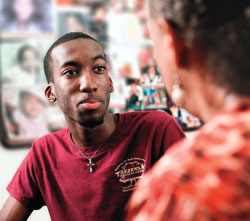 |
| Xavier works with St. Jude’s Sylvia Sutton to record his HIV story. |
[When] I came here to St. Jude, the first thing I realized was the importance of being educated. I realized that’s where a lot of my fear and all of that came from—being ignorant about the disease and how it works and stuff like that. We fear what we don’t understand. We fear the unknown. I say to whoever’s listening: Become educated.
Powerful stuff, right? But to get the full emotional and educational impact of this slice-of-life-with-HIV, you need to listen to it—as told by the person who experienced it. That’s exactly what the Voices project at St. Jude Children’s Research Hospital in Memphis, Tennessee, aims to deliver. For the unique project, HIV-positive patients ages 18 to 24 volunteer to record themselves telling their HIV narrative. Participants decide what to talk about; recordings average about five minutes; and all are anonymous.
So far, 18 narratives (such as the one excerpted at the start of this article) have been filed since 2012. They’re then made available to three sets of St. Jude listeners: clinicians, students and other HIV-positive patients. “We’ve been using the recordings as part of the education for students and other health care providers,” says Aditya Gaur, MD, of St. Jude’s infectious diseases department. “Listening to the patients’ narratives makes the [information] stick and creates empathy. It also helps these learners identify with a patient population and the challenges that come with it. The message is viewed as much more ‘real.’”
The password-protected audio files can also help other patients living with the virus. For example, if someone feels isolated or struggles to take meds regularly, he or she might listen to a recording that touches on those issues. In a sense, these narratives are like an anonymous support group of peers, ready to meet at any moment.
The storytellers benefit, too. Sylvia Sutton, LMSW, a social worker at St. Jude, explains: “Almost everybody who records feels like they’re giving back and helping others—and that makes a difference for them.”
Listen to Xavier explain why he recorded his HIV story for the Voices project.






Comments
Comments